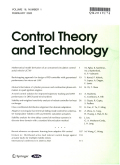- 钛学术文献服务平台 \
- 学术期刊 \
- 工业技术期刊 \
- 自动化技术与计算机技术期刊 \
- 控制理论与技术(英文版)期刊 \
A survey on distributed iterative learning control for transient formation
A survey on distributed iterative learning control for transient formation
基本信息来源于合作网站,原文需代理用户跳转至来源网站获取
摘要:
Distributed control is a hot topic in many research fields.Thanks to the development of communication and computa-tion technologies,plenty of complex engineering problems can resort to the mechanism of distributed control.Of note is that most of the distributed control design only leverages the real-time information of agents,but as a consequence,only some specific steady-state objectives and/or system perfor-mances can be realized.Nonetheless,in many real scenarios,of particular importance are the transient behaviors of con-trol systems.To deal with such problems in conventional situations,iterative learning control (ILC) may provide a good alternative method that has been widely studied.ILC is one of the most popular intelligent control methodologies,which is particularly applicable for control systems running in a repetitive process over some finite time horizon of inter-est (see,e.g.,[1,2] and references therein).As a result,a classic ILC system generally evolves in the presence of two axes,i.e.,the finite time axis and the infinite iteration axis.The working mechanism of ILC is the learning from the past experiences,which enables it to improve the transient per-formances of control systems (along the time axis).Because the implementation of ILC never needs the accurate model information but only the measurement and control data,it belongs to the framework of the model-free control methods in some sense,and thus,is effective in many practical appli-cations,such as robotics,batch processes,and transportation systems.

推荐文章
Basic formation mechanisms of Lake Doroninskoye soda water, East Siberia, Russia
Saline lake
Sulfate reduction
Thermodynamic equilibrium
Windshield Survey在社区护理实践教学中的应用效果研究
社区护理
Windshield Survey
学业自我效能感
实践教学
Organic geochemistry of the Lower Permian Tak Fa Formation in Phetchabun Province, Thailand: implica
Biomarker
Depositional environment
Source inputs
Tak Fa Formation
Khao Khwang Platform
Constraints on sedimentary ages of the Chuanlinggou Formation in the Ming Tombs, Beijing, North Chin
Detrital zircon
LA-ICP-MS U–Pb ages
SHRIMP
Chuanlinggou Formation
Ancient sedimentary environment
North China Craton
内容分析
关键词云
关键词热度
相关文献总数
(/次)
(/年)
文献信息
| 篇名 | A survey on distributed iterative learning control for transient formation | ||
| 来源期刊 | 控制理论与技术(英文版) | 学科 | |
| 关键词 | |||
| 年,卷(期) | 2021,(2) | 所属期刊栏目 | LETTER |
| 研究方向 | 页码范围 | 295-297 | |
| 页数 | 3页 | 分类号 | |
| 字数 | 语种 | 英文 | |
| DOI | |||
五维指标
引文网络
引文网络
二级参考文献 (0)
共引文献 (0)
参考文献 (8)
节点文献
引证文献 (0)
同被引文献 (0)
二级引证文献 (0)
2007(1)
- 参考文献(1)
- 二级参考文献(0)
2010(1)
- 参考文献(1)
- 二级参考文献(0)
2011(1)
- 参考文献(1)
- 二级参考文献(0)
2013(1)
- 参考文献(1)
- 二级参考文献(0)
2016(1)
- 参考文献(1)
- 二级参考文献(0)
2017(1)
- 参考文献(1)
- 二级参考文献(0)
2019(2)
- 参考文献(2)
- 二级参考文献(0)
2021(0)
- 参考文献(0)
- 二级参考文献(0)
- 引证文献(0)
- 二级引证文献(0)
引文网络交叉学科
相关学者/机构
期刊影响力
控制理论与技术(英文版)
主办单位:
华南理工大学
出版周期:
季刊
ISSN:
2095-6983
CN:
44-1706/TP
开本:
16开
出版地:
广州市五山华南理工大学内
邮发代号:
创刊时间:
2003
语种:
eng
出版文献量(篇)
1113
总下载数(次)
0
总被引数(次)
4188
期刊文献
相关文献
推荐文献
- 期刊分类
- 期刊(年)
- 期刊(期)
- 期刊推荐
一般工业技术
交通运输
军事科技
冶金工业
动力工程
化学工业
原子能技术
大学学报
建筑科学
无线电电子学与电信技术
机械与仪表工业
水利工程
环境科学与安全科学
电工技术
石油与天然气工业
矿业工程
自动化技术与计算机技术
航空航天
轻工业与手工业
金属学与金属工艺
控制理论与技术(英文版)2022
控制理论与技术(英文版)2021
控制理论与技术(英文版)2020
控制理论与技术(英文版)2019
控制理论与技术(英文版)2018
控制理论与技术(英文版)2017
控制理论与技术(英文版)2016
控制理论与技术(英文版)2015
控制理论与技术(英文版)2014
控制理论与技术(英文版)2013
控制理论与技术(英文版)2012
控制理论与技术(英文版)2011
控制理论与技术(英文版)2010
控制理论与技术(英文版)2009
控制理论与技术(英文版)2008
控制理论与技术(英文版)2007
控制理论与技术(英文版)2006
控制理论与技术(英文版)2005
控制理论与技术(英文版)2004
控制理论与技术(英文版)2003

 免费查重
免费查重










